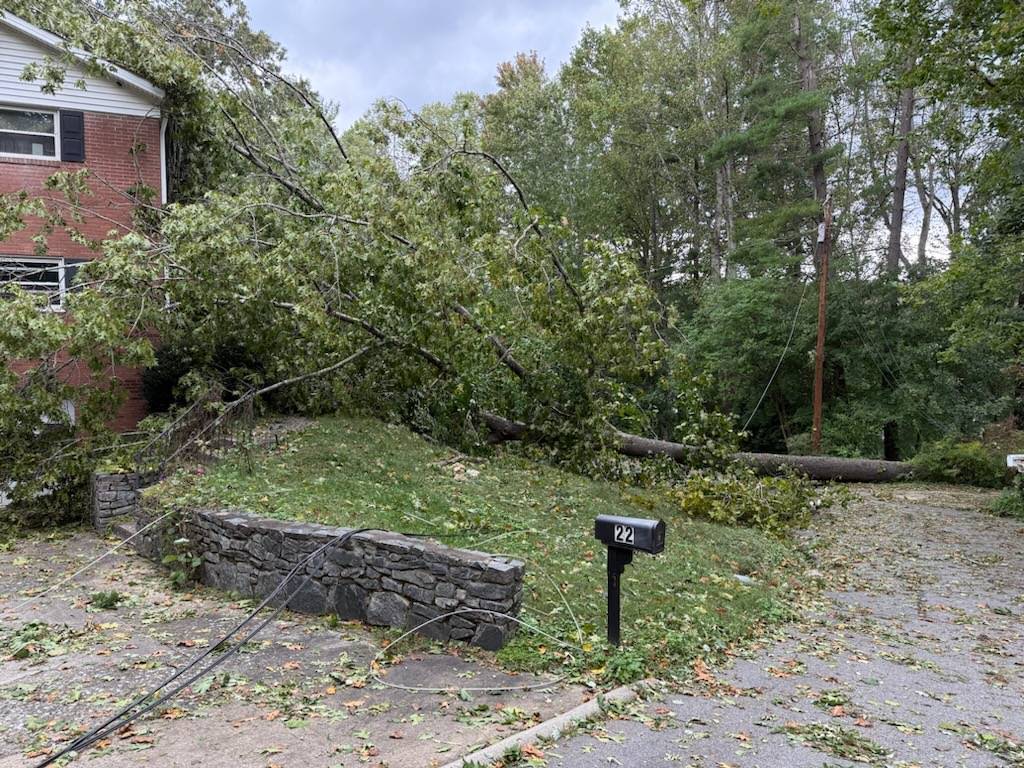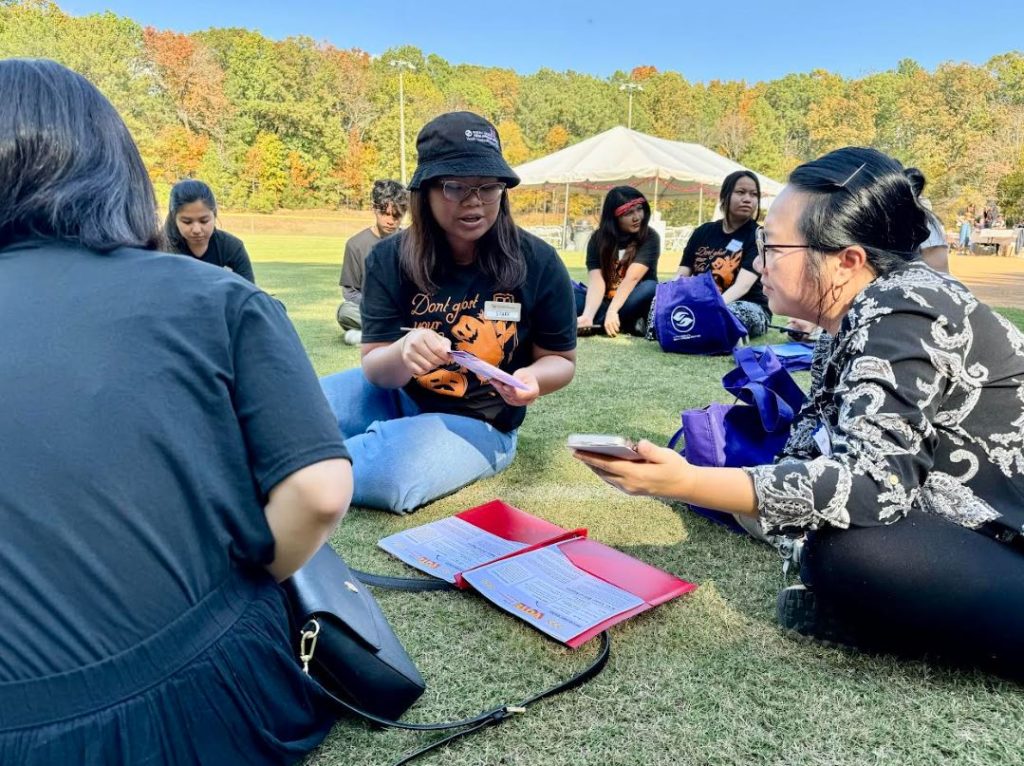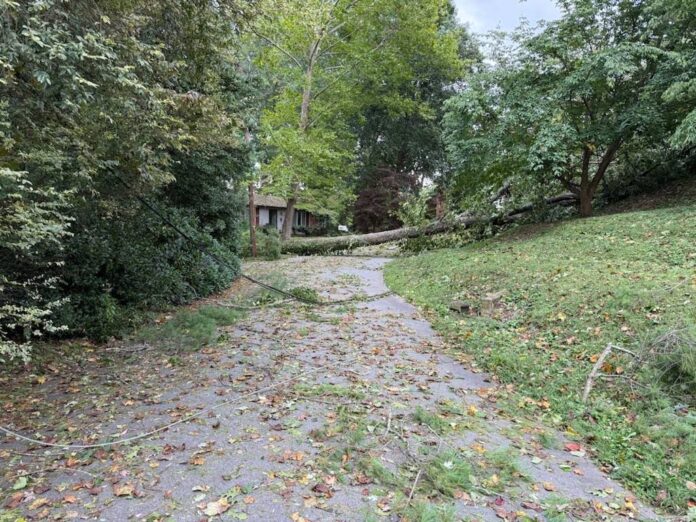By Joie Chen
Headed into the last weekend of September, Carol Nguyen Steen had planned a busy weekend of voter canvassing with the “small but mighty” AAPI community in western North Carolina. They’d go door-to-door, encouraging roughly 3400 eligible AAPIs in and around Asheville to vote—reminding them that in this pivotal election, North Carolina had become a key swing state – their votes could make a difference.
Then came Hurricane Helene.
The storm made landfall on the Gulf coast Thursday night, September 26th, and soon brought unimaginable devastation to the mountain towns in this part of North Carolina. Whole communities were washed away in the floods and mudslides brought by the torrential rain. Rural areas and even the city of Asheville were cut off from help as roadways collapsed or were buried under mud and debris.
Now, just over a month later, a long recovery effort is underway. Power is back for most, but communications are still spotty in some areas. Carol Steen’s North Asheville neighborhood—like most others in this area– still doesn’t have potable water.
“But we were blessed,” Steen says. “Our home had only minimal damage. We lost three trees and our neighbor lost a 150-year-old-tree so we were blocked in at the beginning. But we were blessed.”
Unable to stay at home, Steen and her family spent weeks camping out in Atlanta and Durham, and just this week returned to stay with relatives on well water in rural Buncombe County. She and her husband were eager to get back to help rebuild—and to help western North Carolina plan for its future.
While the crisis is still top of mind, advocates are trying, gently, to urge voters to the polls. Across the state, early voting is smashing records with more than two million votes cast; in Buncombe County 40% have voted early, but just over 31% of AAPI voters.
“The main challenge for the community now is to figure out, ‘Do I have a home, shelter, utilities?’ Any momentum that we had to build up the campaign, it’s on the back burner from where things were in early September,” Steen says.
“Before the hurricane, I thought that there would be more interest in the election,” agrees Sendra Yang of the North Carolina Hmong Women Association, which had been registering voters in the largest AAPI ethnic community in the western part of the state. It is still posting election information and encouragement tailored to Hmong voters.
“But now I think the immediate concerns have shifted from being engaged, to, I think, just surviving.”

Yang says the most recent census found as many as 10,000 Hmong living in several western and southwestern counties—the largest AAPI population in that part of the state. North Carolina is third (after Minnesota and California) among states with the largest Hmong populations, drawn largely by economic opportunity and a topography and environment similar to their native communities in Laos and Thailand.
“The Hmong families chose more rural areas because of how the Hmong people have historically lived,” Yang says. “They like their space, they like doing what they do, and they just like being able to farm on their own land and grow their own food. So, I think those communities allow them to be able to feel at home.”
But their isolation and lack of language access present challenges for both voting and storm recovery. “They feel like they don’t have a voice. They’ve been unseen and forgotten for so long,” she explains. Her group has not identified any Hmong fatalities related to the storm and property damage was less severe than in other areas. But it took intervention from the Hmong Women Association to identify their community’s specific needs; while all food aid was appreciated, the HWA stepped in to help get their people the emergency rations they most wanted: rice, canned Asian vegetables and ‘Mama’ brand instant noodles.
Just as urgent is the need to help the community understand what government aid is available to them.
“Right now, it’s helping them apply for FEMA assistance and other types of state government assistance. They didn’t even know that existed,” Yang says. “They didn’t know about it. And the other thing is the majority of it is in a language they don’t understand.”
In this contentious election season, locals do understand that their misery can be exploited by campaigners seeking a ‘disaster porn’ backdrop for political purposes.
Saiesh “Sai” Srivastava recently moved from Swannanoa, the hard-hit community visited by former President Donald Trump, who presented a blistering and inaccurate depiction of FEMA’s response to the disaster. Mr. Trump repeated false claims that the federal agency was diverting funds to unauthorized migrants instead of local survivors.
“That is very misinformative,” Srivastava says. “And I can say that as a community organizer who’s been doing work with hurricane relief.” Both Srivastava and Yang cite the small payments known as “D-SNAP” or “Disaster SNAP” that provided ‘no-questions-asked’ cash to survivors in the first days after Helene struck, but led some survivors to think no more aid would be coming.
“There’s like, this immediate idea of, ‘Oh, I’m not getting what I need,” Srivastava says. “And because that misinformation has spread that this is all people are getting, I think there is a very contentious environment where people are saying, ‘Oh, the government doesn’t care about us. They’re gonna let us die because they don’t want us to vote this year.’”
Srivastava says those fears may be motivating to voters who suspect a suppression movement underway. “As an organizer, as much as I love that people are seeing this as an opportunity to take action, a lot of this is incredibly misinformative.”
“Additionally, I’ve heard a bunch of rumors that ICE is out there with FEMA, which is also not true. I think using immigrants in this context as a way to really get people angry and rile people up under such difficult circumstances, I think it is, can I swear? It’s a s—-y thing to do, right?”

With little time to correct bad information, the non-partisan civic engagement group North Carolina Asian Americans Together (NCAAT) has launched a high-touch and focused effort to turn out the state’s AAPI voters. The last weekend before Election Day will see an all-out push, especially in the Research Triangle area around Raleigh-Durham, where the state’s AAPI population is concentrated.
Back in Buncombe County, Carol Steen worries that the false narratives will breed more skepticism and distrust. “It’s not going to be easy to navigate and educate with accurate information when there is a candidate who is playing into misinformation and playing off fears of people who don’t trust the government,” she says. But she praises state leaders who spoke up in the face of a misinformation landslide. “I appreciate the state representatives, on both sides, who did a great job in a non-partisan way to get the word out: ‘The federal government Is here to help’.”
It’s a delicate message to communicate in the final days before this pivotal election, she acknowledges. “They were there to campaign but also to stop the misinformation,” at a moment when the still-fragile state needs accurate information about both candidates and the crisis from which they have yet to recover.
(This coverage was made possible by a grant through the URL Collective, a nonprofit supporting local, diverse media. AsAmNews and URL Collective have partnered to bring you election reporting from grassroots media.)
AsAmNews is published by the non-profit, Asian American Media Inc.
We’d love to hear from you. Please fill out our two-minute survey by October 30.
Then purchase your tickets to Up Close with Connie Chung, America’s first Asian American to anchor a nightly network newscast. The in-depth conversation with Connie will be held November 14 at 7:30 at Columbia University’s Milbank Chapel in the Teacher’s College. All proceeds benefit AsAmNews.

